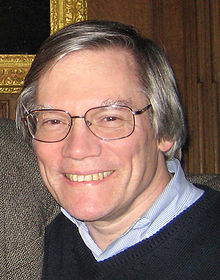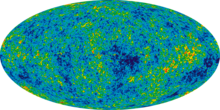Alan Guth | |
|---|---|
 Guth at Trinity College, Cambridge, 2007 | |
| Born | Alan Harvey Guth February 27, 1947 |
| Nationality | American |
| Alma mater | Massachusetts Institute of Technology (BS, MS, PhD) |
| Known for | Cosmic inflation Borde–Guth–Vilenkin theorem Inflaton |
| Spouse |
Susan Tisch (m. 1971) |
| Children | 2, including Larry Guth |
| Awards | Oskar Klein Medal (1991) Benjamin Franklin Medal for Physics of the Franklin Institute |
| Scientific career | |
| Fields | Cosmology, theoretical physics, particle physics |
| Institutions | Princeton Columbia Cornell Stanford Linear Accelerator MIT |
| Doctoral advisor | Francis E. Low |
| Part of a series on |
| Physical cosmology |
|---|
 |
Alan Harvey Guth (/ɡuːθ/; born February 27, 1947) is an American theoretical physicist and cosmologist who is the Victor Weisskopf Professor of Physics at the Massachusetts Institute of Technology. Along with Alexei Starobinsky and Andrei Linde, he won the 2014 Kavli Prize "for pioneering the theory of cosmic inflation."[1] Guth's research focuses on elementary particle theory and how particle theory is applicable to the early universe.
He graduated from MIT in 1968 in physics and stayed to receive a master's and a doctorate, also in physics.
As a junior particle physicist, Guth developed the idea of cosmic inflation in 1979 at Cornell and gave his first seminar on the subject in January 1980.[2][3] Moving on to the SLAC Theory Group at Stanford University, Guth formally proposed the idea of cosmic inflation in 1981, the idea that the nascent universe passed through a phase of exponential expansion that was driven by a positive vacuum energy density (negative vacuum pressure). The results of the WMAP mission in 2006 made the case for cosmic inflation very compelling.
- ^ "2014 Astrophysics Citation". The Kavli Foundation. Archived from the original on July 14, 2014. Retrieved July 27, 2014.
- ^ Guth, Alan H. (1997), The Inflationary Universe, Reading, Massachusetts: Perseus Books, ISBN 0-201-14942-7
- ^ SLAC seminar, "10-35 seconds after the Big Bang", January 23, 1980. see Guth (1997), pg 186.